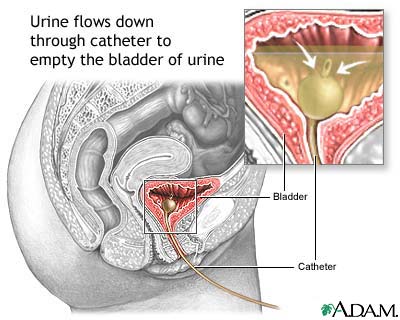Symptoms & Signs
The symptoms of a bladder infection include:
- Cloudy or bloody urine, which may have a foul or strong odor
- Low fever (not everyone will have a fever)
- Pain or burning with urination
- Pressure or cramping in the lower abdomen (usually middle) or back
- Strong need to urinate often, even right after the bladder has been emptied
If the infection spreads to your kidneys, symptoms may include:
- Chills and shaking or night sweats
- Fatigue and a general ill feeling
- Fever above 101 degrees Fahrenheit
- Flank (side), back, or groin pain
- Flushed, warm, or reddened skin
- Mental changes or confusion (in the elderly, these symptoms often are the only signs of a UTI)
- Nausea and vomiting
- Severe abdominal pain (sometimes)
Diagnosis & Tests
A urine sample is usually collected to perform the following tests:
- Urinalysis is done to look for white blood cells, red blood cells, bacteria, and to test for certain chemicals, such as nitrites in the urine. Most of the time, your doctor or nurse can diagnose an infection using a urinalysis.
- Urine culture – clean catch may be done to identify the bacteria in the urine to make sure the correct antibiotic is being used for treatment.
CBC and a blood culture may be done.
The following tests may be done to help rule out problems in your urinary system that might lead to infection or make a UTI harder to treat:
- CT scan of the abdomen
- Intravenous pyelogram (IVP)
- Kidney scan
- Kidney ultrasound
- Voiding cystourethrogram
Pictures & Images
Bladder catheterization, female-
Urinary tract infection – adults: Overview, Causes
-
Urinary tract infection – adults: Symptoms & Signs, Diagnosis & Tests
-
Urinary tract infection – adults: Treatment
Review Date : 10/6/2009
Reviewed By : David C. Dugdale, III, MD, Professor of Medicine, Division of General Medicine, Department of Medicine, University of Washington School of Medicine. Also reviewed by David Zieve, MD, MHA, Medical Director, A.D.A.M., Inc.
The information provided herein should not be used during any medical emergency or for the diagnosis or treatment of any medical condition. A licensed medical professional should be consulted for diagnosis and treatment of any and all medical conditions. Call 911 for all medical emergencies. Links to other sites are provided for information only — they do not constitute endorsements of those other sites. © 1997- 2010 A.D.A.M., Inc. Any duplication or distribution of the information contained herein is strictly prohibited.
![]()

